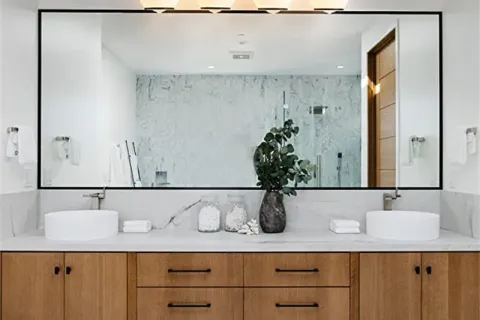Remember not to mix excessively warm and excessively cool light sources, otherwise, skin tone discrepancies and uneven lighting will occur. If one bathroom vanity lamp is too yellow and another is too white, it will cause uneven skin tones reflected in the mirror.
Referring to the International Electrotechnical Commission (IEC) standards for bathroom zone classification: Most home vanities are located in Zone 2 or the dry zone. An IP44-rated bathroom vanity light is both economical and safe, fully meeting daily usage needs.
A basic and widely used rule of thumb is: Choose a light fixture that is approximately 75% the width of your vanity and install it directly above the mirror, about 75 to 85 inches above the mirror. In other words, assuming your vanity is 48 inches wide, the ideal bathroom vanity light should be around 36 inches wide.
The color rendering index (CRI) is an optical indicator proposed by the International Commission on Illumination (CIE) to measure the accuracy with which a light source reproduces the colors of objects. It is expressed as a percentage; the higher the value, the more accurate the color reproduction of the light source.
Key Eye-Friendly Parameters for LED Vanity Light Fixtures: 1. Luminous Flux (Brightness) 2. Color Temperature (Cool or Warm) 3. Color Rendering Index (CRI or Ra value) 4. Blue Light Hazard and Wavelength Control 5. Flicker-Free Design 6. Beam Uniformity and Anti-Glare Design 7. Power and Energy Efficiency 8. Adjustable Light Modes and Memory Function 9. Light Decay and Lifespan
• For mirrors less than 60cm wide, one symmetrical bathroom vanity light fixture can be installed. • For mirrors between 60cm and 120cm wide, two symmetrically arranged vanity lamps are recommended. • For mirrors exceeding 120cm or for vanities used by two people, consider three or more light fixtures or an integrated front light strip design.
Yes, but certain installation principles and conditions must be met. From a lighting design perspective, installing bathroom vanity light fixtures above a mirror is a common and widely accepted lighting method. It can directly illuminate the entire face, avoiding shadows concentrated on the chin or eyes
Because bathrooms are humid environments, electrical safety is paramount for prolonged use. Choose bathroom vanity light fixtures from reputable manufacturers and with an IP44 rating or higher. They are safe for extended use.
LED vanity light fixtures typically feature a frosted cover or light diffuser design, providing a soft and even coverage of the face, avoiding glare and partial shadows. Traditional bulbs, on the other hand, produce concentrated light with noticeable spotlights.
Installing lighting above the vanity is not only a functional consideration; it also contributes to the overall comfort of the bathroom space. Effective lighting can reduce shadows and uneven lighting, creating a bright, soft glow around the mirrored area and preventing visual fatigue caused by unpleasant lighting.
Mainland China is the global core region for LED vanity lamp production. According to industry data, approximately 70%-80% of LED vanity lamps are produced in China. For example, Huari Lighting, a professional LED lighting manufacturer from Foshan, produces over one million lamps and lighting fixtures per month.
The width of bathroom vanity light fixtures must first meet scientific requirements for light coverage. The human face is a three-dimensional curved surface. If the fixture width is smaller than the mirror width, uneven lighting can easily occur.












